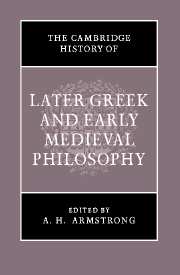Book contents
- Frontmatter
- Chapter 1 Introductory
- Part 1 GREEK PHILOSOPHY FROM PLATO TO PLOTINUS
- Part II PHILO AND THE BEGINNINGS OF CHRISTIAN THOUGHT
- Part III PLOTINUS
- Part IV THE LATER NEOPLATONISTS
- Part V MARIUS VICTORINUS AND AUGUSTINE
- Part VI THE GREEK CHRISTIAN PLATONIST TRADITION FROM THE CAPPADOCIANS TO MAXIMUS AND ERIUGENA
- Part VII WESTERN CHRISTIAN THOUGHT FROM BOETHIUS TO ANSELM
- Part VIII EARLY ISLAMIC PHILOSOPHY
- Select Bibliography
- Additional Notes and Bibliography
- Index of ancient and medieval works referred to in the text
- General Index
- Index of Greek terms
- References
Chapter 1 - Introductory
Published online by Cambridge University Press: 28 March 2008
- Frontmatter
- Chapter 1 Introductory
- Part 1 GREEK PHILOSOPHY FROM PLATO TO PLOTINUS
- Part II PHILO AND THE BEGINNINGS OF CHRISTIAN THOUGHT
- Part III PLOTINUS
- Part IV THE LATER NEOPLATONISTS
- Part V MARIUS VICTORINUS AND AUGUSTINE
- Part VI THE GREEK CHRISTIAN PLATONIST TRADITION FROM THE CAPPADOCIANS TO MAXIMUS AND ERIUGENA
- Part VII WESTERN CHRISTIAN THOUGHT FROM BOETHIUS TO ANSELM
- Part VIII EARLY ISLAMIC PHILOSOPHY
- Select Bibliography
- Additional Notes and Bibliography
- Index of ancient and medieval works referred to in the text
- General Index
- Index of Greek terms
- References
Summary
What we are trying to do in this volume is to provide a wide-ranging and fairly detailed survey of the philosophy of the period when thought in the Mediterranean lands, and later in Europe north of the Alps, took forms which deeply influenced our literature, art, social behaviour and institutions at least down to the seventeenth century and, to some extent and in some quarters, to the present day. We set out to show how Greek philosophy reached its latest, and perhaps most influential, phase, that which modern historians of ancient philosophy call Neoplatonism; and how this was taken over and adapted in various ways to suit their own purposes by Jews, Christians and Moslems. Whatever the relationship of this late Platonism to the real thought of Plato may have been (here Merlan has some interesting suggestions in the first chapter of his section), it is certain that it is this, rather than the Platonism of the dialogues as understood by modern scholars, which we encounter whenever there is a question of Platonic influence on art, literature, theology or philosophy before the nineteenth century, and sometimes even later. It, and its various theological transformations, therefore seem worth studying, and in recent years they have been vigorously studied. There is a great deal going on, in particular, in the fields of Neoplatonic and patristic studies: so much, in fact, that inevitably agood deal in this volume will be out of date by the time it is published. But it still seems worth while attempting a comprehensive survey, because much of the scholarly material is rather inaccessible except to specialists in the various fields, and also because the study of this period, lying as it does across the frontiers of so many disciplines, has suffered rather more than most from academic compartmentalization.
- Type
- Chapter
- Information
- Publisher: Cambridge University PressPrint publication year: 1967

